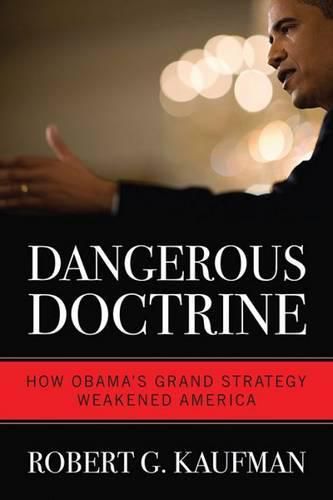Readings Newsletter
Become a Readings Member to make your shopping experience even easier.
Sign in or sign up for free!
You’re not far away from qualifying for FREE standard shipping within Australia
You’ve qualified for FREE standard shipping within Australia
The cart is loading…






Much like Margaret Thatcher and Ronald Reagan, President Barack Obama came to office as a politician who emphasized conviction rather than consensus. During his 2008 presidential campaign, he pledged to transform the role of the United States abroad. His ambitious foreign policy goals included a global climate treaty, the peaceful withdrawal of American military forces from Iraq and Afghanistan, and a new relationship with Iran. Throughout Obama’s tenure, pundits and scholars have offered competing interpretations of his grand strategy, while others have maintained that his policies were incoherent or, at best, ad hoc. In Dangerous Doctrine, political scientist Robert G. Kaufman argues that the forty-fourth president has indeed articulated a clear, consistent national security policy and has pursued it with remarkable fidelity. Yet Kaufman contends that President Obama has imprudently abandoned the muscular internationalism that has marked US foreign policy since the end of World War II. Drawing on international relations theory and American diplomatic history, Kaufman presents a robust critique of the Obama doctrine as he situates the president’s use of power within the traditions of American strategic practice. Focusing on the pivotal regions of Europe, the Middle East, and Asia, this provocative study demonstrates how current executive branch leadership threatens America’s role as a superpower, weakening its ability to spread democracy and counter threats to geopolitical order in increasingly unstable times. Kaufman proposes a return to the grand strategy of moral democratic realism, as practiced by presidents such as Harry S. Truman, Ronald Reagan, and George W. Bush, with the hope of reestablishing the United States as the world’s dominant power.
$9.00 standard shipping within Australia
FREE standard shipping within Australia for orders over $100.00
Express & International shipping calculated at checkout
Much like Margaret Thatcher and Ronald Reagan, President Barack Obama came to office as a politician who emphasized conviction rather than consensus. During his 2008 presidential campaign, he pledged to transform the role of the United States abroad. His ambitious foreign policy goals included a global climate treaty, the peaceful withdrawal of American military forces from Iraq and Afghanistan, and a new relationship with Iran. Throughout Obama’s tenure, pundits and scholars have offered competing interpretations of his grand strategy, while others have maintained that his policies were incoherent or, at best, ad hoc. In Dangerous Doctrine, political scientist Robert G. Kaufman argues that the forty-fourth president has indeed articulated a clear, consistent national security policy and has pursued it with remarkable fidelity. Yet Kaufman contends that President Obama has imprudently abandoned the muscular internationalism that has marked US foreign policy since the end of World War II. Drawing on international relations theory and American diplomatic history, Kaufman presents a robust critique of the Obama doctrine as he situates the president’s use of power within the traditions of American strategic practice. Focusing on the pivotal regions of Europe, the Middle East, and Asia, this provocative study demonstrates how current executive branch leadership threatens America’s role as a superpower, weakening its ability to spread democracy and counter threats to geopolitical order in increasingly unstable times. Kaufman proposes a return to the grand strategy of moral democratic realism, as practiced by presidents such as Harry S. Truman, Ronald Reagan, and George W. Bush, with the hope of reestablishing the United States as the world’s dominant power.